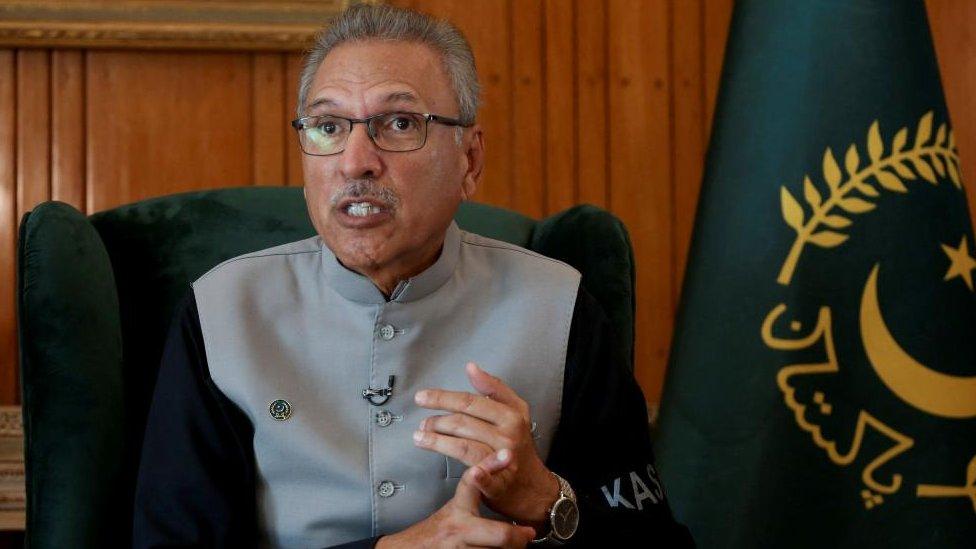Pakistan president denies approving laws giving military more power
- Published

Pakistan President Arif Alvi has denied signing two controversial bills
Pakistan's President Arif Alvi denied approving two controversial bills which further enhance the military's powers.
In a post on X, external (formerly known as Twitter) on Sunday, he said he returned the bills unsigned but his staff "undermined my will".
The two laws make it an offence to reveal the identities of military intelligence officers and also propose jail terms for defaming the army.
Mr Alvi's statement could call the legality of the two laws into question.
However, Pakistan's interim law minister Ahmed Irfan Aslam told reporters that under the constitution, the president had the option of either giving assent to the bills, or referring them to parliament with "specific observations".
Instead, Dr Alvi "purposely delayed the assent", and returned the bills with neither assent nor observations, he said.
Mr Aslam added that since the signed bills were not received from the president even after 10 days, they automatically became law.
A gazette from the Senate Secretariat stated that they were "deemed to have been assented to by the president".
The disputed bills were sent to President Alvi before parliament was dissolved on 9 August, with the aim of holding elections in November.
However, the polls have been postponed until February as the electoral commission says electoral boundaries must be redrawn to reflect fresh census data, a months-long process, before polls can be held.
The country is currently under a caretaker government.
Earlier this month, the Official Secrets (Amendment) Bill and the Pakistan Army (Amendment) Bill provoked bitter debate in the National Assembly.
The former bill recommends a three-year jail term and a fine of up to 10 million rupees (£27,000 ; $34,000) for anyone who discloses the identity of an intelligence official, informant or source, while the latter imposes a jail term of up to five years on anyone who discloses sensitive information relating to national security.
Both the opposition Pakistan Tehreek-e-Insaf (PTI) and the coalition partners of the the ruling Pakistan Muslim League Nawaz (PML-N) called the government out for passing "draconian laws in haste" and without discussion.
The laws have already been used to arrest some opposition members. PTI vice chair Shah Mehmood Qureshi was arrested over the weekend under the Official Secrets Act.
The PTI claimed that Mr Qureshi was detained for holding a press conference where he challenged the postponement of the election. Authorities accuse him of leaking the contents of a secret diplomatic cable for political gain.
The Pakistani intelligence services are regularly accused of illegally detaining opposition members, politicians, activists and journalists, with human rights organisations noting the increasing number of enforced disappearances every month.
The PTI has also said that it will take the disputed bills to the Supreme Court, and declared its "complete support" for the president.
Mr Alvi is a founding member of the PTI, led by former prime minister Imran Khan. Mr Khan's arrest in May saw violent protests that also targeted military cantonments. Since then, the party has been systematically targeted, with many key leaders, including Mr Khan, given jail sentences over a variety of charges.